#Maldives #ResponsibleTourism #politics #geopolitics #women #climatechange #impact #pollution #CO2 #platic

Summary: The shadow of a nightmare is spreading over the archipelago, where climate change is causing rising water levels in one of the flattest regions in the world. We need responsibility and action.
The shadow of a nightmare spreads over the archipelago. Postcards have much to do with luminous lagoons and sunsets, but a lucid eye sees other landscapes and perspectives. Something is screaming in the Maldives. Something is dying. Reader, if you want to preserve the beautiful image of the “end of the world”, I invite you to leave this page. If you stay, know that natural beauty is in decline. It gives way, gradually, as if out of weariness.
Everywhere, by the sea, plastic waste. Communities, anxious to protect themselves from flooding, have erected barriers, but rising waters threaten them with disappearance within thirty years. The Maldives would then be the first country in the world to be wiped off the map. The first engulfment. Symbolically, it would be the beginning of the end.
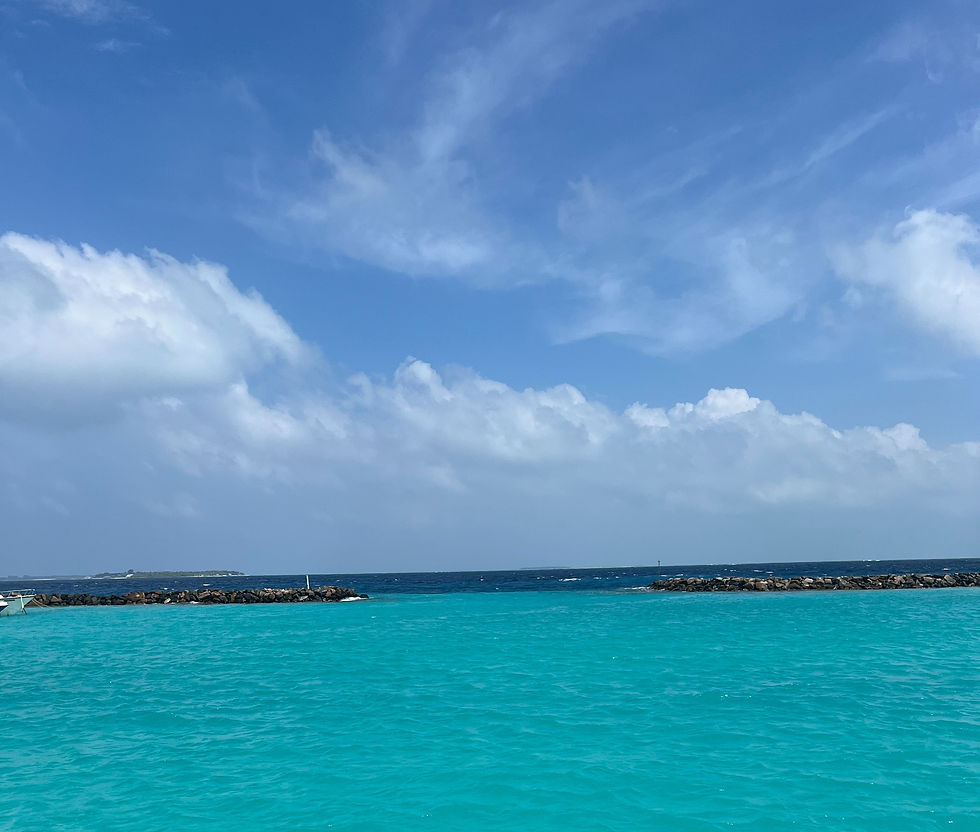
One thousand one hundred ninety-six low islands, organized in a double chain of 26 atolls, so flat that they barely pierce the horizon. A culture forged over 2,500 years of maritime life. Because numbers speak, numbers matter. Here, they give us the extent of this destruction announced by the most recent studies.
We settled in the community of Dharavandhoo. The missions of the NGO Invisibles aimed to discover women's education level, understand the culture of marriage and determine the average age of first pregnancy. We studied their purchasing power and the difficulties linked to insularity. However, travel dictates its rules, and another emergency has arisen for us. The real emergency that should hold all our attention was the rising waters and its threats.
What future for the locals? Will the paradise island be an underwater tomb? The race is on. On the one hand, the acceleration of climate change. On the other hand, these attempts to resist the hope that world leaders will reduce their carbon emissions. At great expense, the archipelago is banking on constructing a raised artificial island to accommodate the majority of its 555,000 inhabitants. At the same time, a Dutch design firm plans to build 5,000 floating houses on pontoons anchored in a lagoon across the capital. Inventiveness and ardour in the absence of common sense. But, with what success? Nobody knows.
At the same time, the major international hotel chains anticipate the dark future and know that this place will become unusable in the short term. The classic colonial approach pursues economic growth without generating the slightest local value. A remunerative presence. A destructive impact. And "after us, the flood". Literally.
In large cities, we are projecting a 1.5-degree increase in temperature. We consider it, we think about it. Eventually, we prepare. In the Maldives, it is a daily battle. During COP26, President Ibrahim Mohamed Solid indicated what two additional degrees would mean:
"The difference between 1.5 and 2 degrees is a death sentence for Maldivians."
At the current rate, we are off to 4 degrees.
If global warming is currently the greatest danger for Maldivians, it is not the only one. We must add the monsoons. The zone is seismic, so we must add earthquakes and tsunamis. The inhabitants need the means to measure the impact of the tourism they attract. Still, they perfectly perceive the daily alarms of nature. Torrential rains, increasing humidity levels, excessive heat: the quality of life of an entire people is disrupted. Even the fauna is experiencing its transformations: I remember, a few years ago, residents playing with sharks by the sea. There are no more today.
One of the contingency plans is to save the Maldivians through relocation to Australia. But we cannot ignore that survival immigration to this island is already strong, particularly from India and Pakistan. Recent history shows us that mass migratory movements are not without causing various economic and social issues.
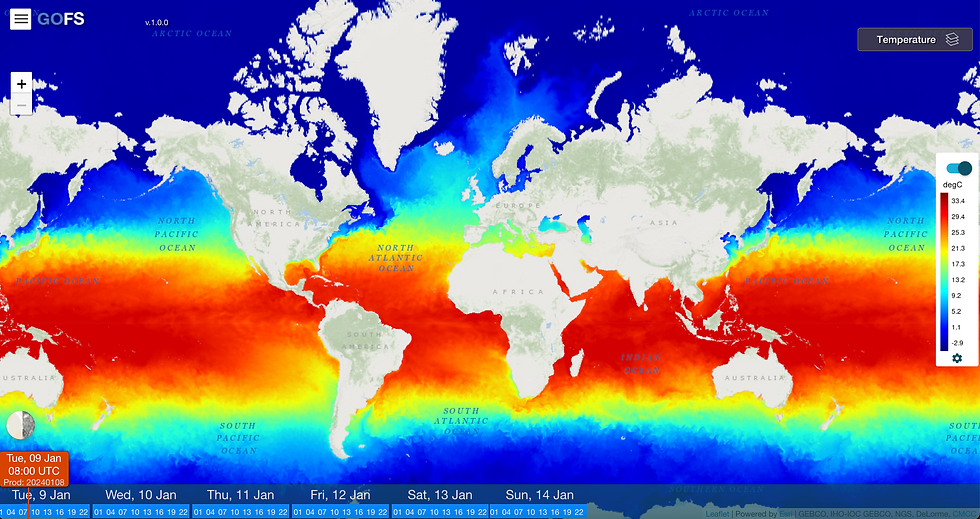
A clear observation
We fear immigration, which is nevertheless apparent. And of necessity. Climate change will spare no continent. Some fear loss of identity. Others, the loss of their place of life. When the Maldives' turn comes, the question of what is savable and what will be lost forever will arise. All this is being prepared in advance now. I refuse to minimize everyone's responsibility for their lifestyle. Voting in elections, choice in consumption: every action has an impact. Remember that the law of supply and demand dominates every industry.
The desperate reshuffles
We must understand this: the rising waters have already begun. As a result, the archipelago is in constant restructuring in an attempt to cope.
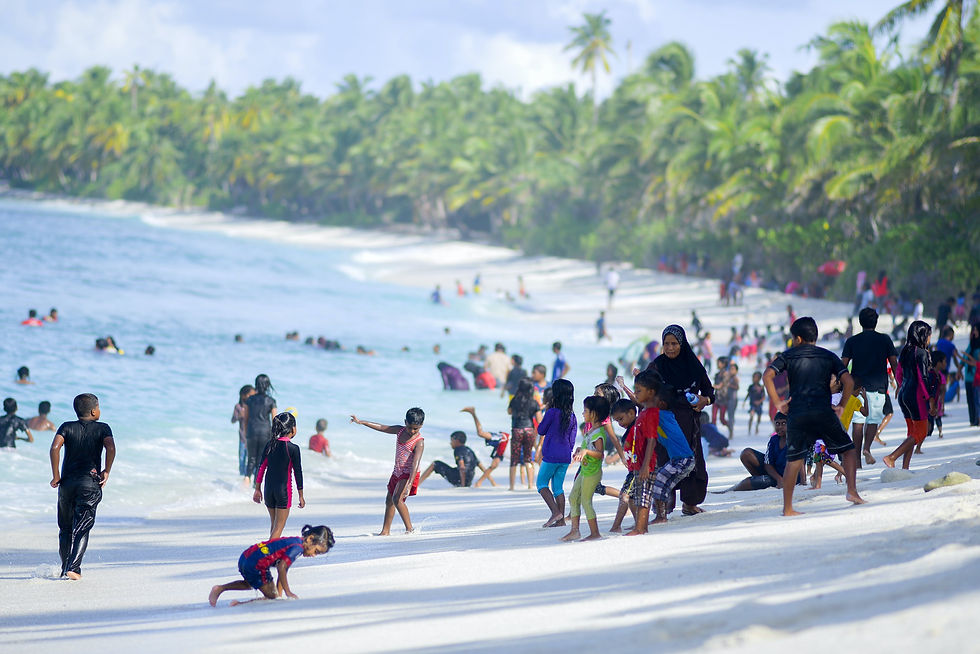
On October 17, 2019, the first underwater Council of Ministers in History occurred. A cleverly orchestrated media stunt allowed the Maldivians' situation to be discussed two months before the Copenhagen summit. It is the work of Mohamed Nasheed, a former journalist who became, in 2008, the first democratically elected president of the Republic of Maldives—thirty years of dictatorship then ended. His philosophy? "We cannot negotiate with nature." He is right. Especially when your country, the flattest in the world, sees its coral asphyxiated and its beaches eroded, pushing the population towards less exposed islands. To stop the surge of the Indian Ocean, Nasheed consolidates, builds dikes with millions, and pumps tons of sand to prevent erosion in vain.
In four decades, rehabilitation projects have increased the country's surface area by around 10% (or 300 km²). All the islands are sheltered behind rock barriers, which, upon closer inspection, are nothing more than bandages. In a recent report, Human Rights Watch (HRW) accuses authorities of not respecting their environmental regulations: rehabilitation projects are "often hasty" and lack appropriate moderation policies.
"The Maldives government has ignored or undermined environmental protection laws, increasing the risk of flooding and other damage to island communities," HRW said.
We must add to this table the infiltration of land by salt, which corrupts fresh water. "Every island in the Maldives is running out of fresh water," Shauna Aminath, 38, environment minister in the previous government, told AFP. She said almost all of the archipelago's 187 inhabited islets rely on expensive desalination plants.
Is this a rarity? No. 97.5% of the water on Earth is salty, and many other regions of the world face this problem. According to the 2020 Ecological Threat Register, approximately 2.6 billion people live in countries exposed to high and extreme levels of water stress.
Let's end with the difficulties of wastewater management and their terrible symbolism. In certain parts of the island, you can smell the sewage through the transparent water—the stench of the future like a bad omen.
Three scenarios for tomorrow
Scenario 1: The historic decision
Creation of a "universal right to mobility". We must prepare for massive population movements; let's affirm this right to live somewhere. In time, the international community came to its senses, and India ceded part of its territory to the Maldives.
Scenario 2: Referral to the International Criminal Court on behalf of the Maldivian people
A trial then begins for crimes against humanity. States that have deliberately neglected the climate crisis and directly caused the dispersion of the Maldivian people are targeted.
Scenario 3: Horror
Nothing is done. Large-scale disasters keep coming. Almost the entire Maldivian people disappear. In addition to the inhabitants, a language, a history, and a culture are disappearing.
"(Indigenous) languages are already vulnerable and in danger," explains Anastasia Riehl, head of the linguistics department at Queen's University (Canada).
Testimonials
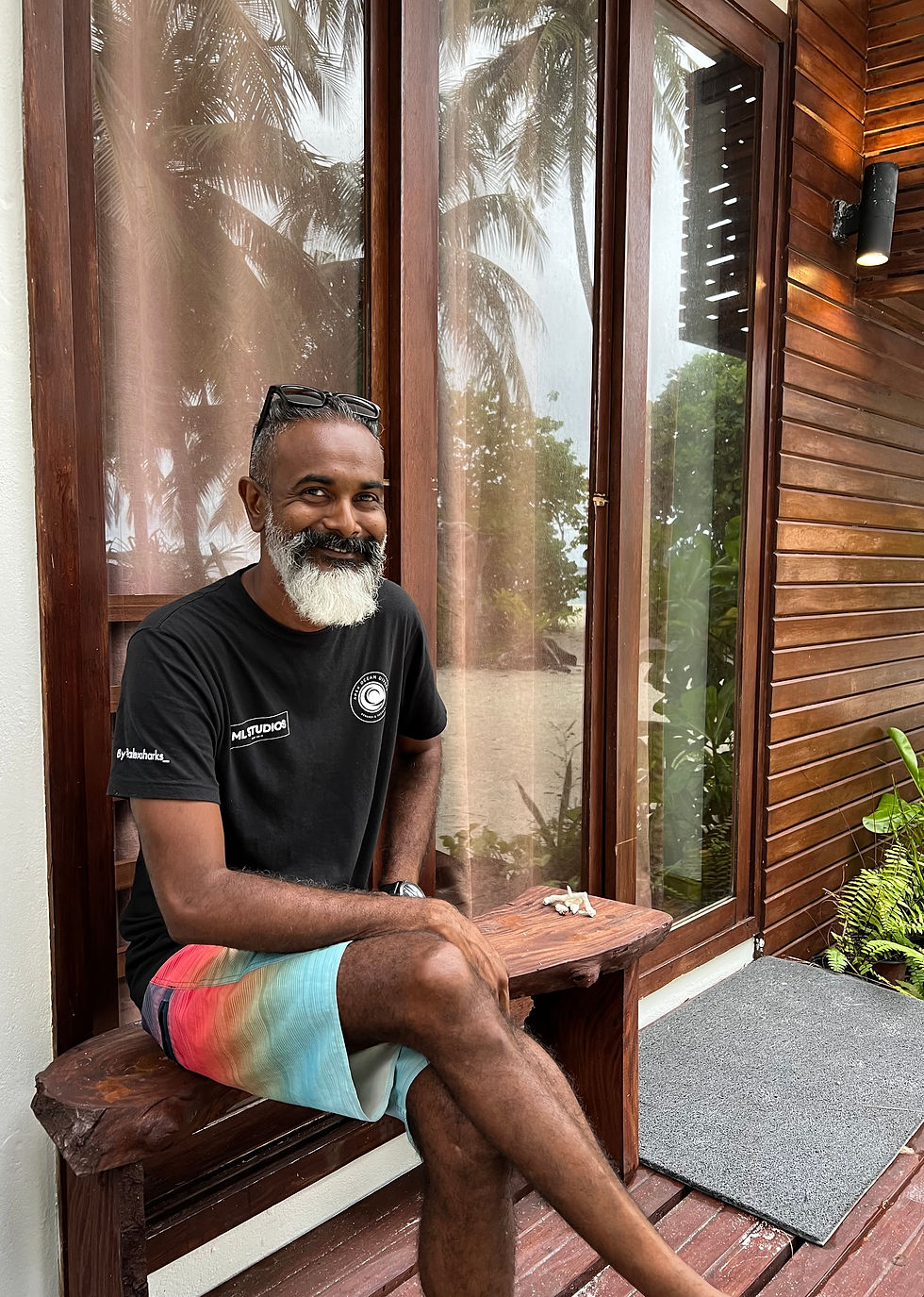
We met Rish, a local entrepreneur. Diver and chef of a seaside Aveyla hotel , he focuses on land and underwater. He nevertheless retains a remarkable, perhaps unrealistic, optimism. As manager of a diving association, he was able to see the consequences of climate change and illegal fishing:
"Corals move, die, animals leave, the shark, essential for the balance of the ecosystem, is the first victim of illegal fishing – its disappearance is proof of this."
It is evident, he tells us, that the preservation of biodiversity and the ecosystem is not a priority of the powerful. He laments with emotion his government's neglect of establishing tourism stakeholders despite the annoyance of the locals.
"I don't dream of a career in Europe. What inspires me and what I have passed on to my children is the protection of the land where we come from and where we will end up."
His passion for the place amazes me. His optimism, too:
"During dives, despite everything, we observe that nature manages to fight, that it moves, but that it gains strength. It gives me energy and confidence."
He concludes: "The future is bright".
I would like to believe it. Not everyone, unfortunately, is as optimistic as Ibrahim. In his eyes, the future of the Maldives is already written in black letters. Despite all his love for this island, where he has always lived, he has settled his two children in Malé, the capital. He is preparing a future for them in Europe.
Locals complain a lot about the "change of seasons". According to them, the rainy season has shifted for three years, destabilizing an entire tourist ecosystem.
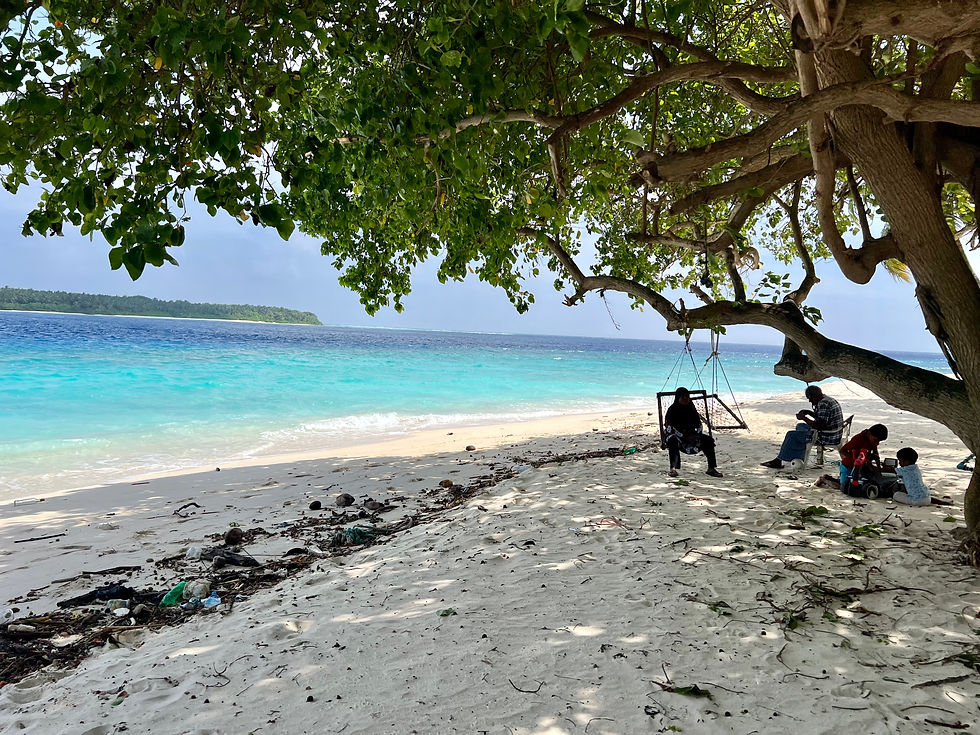
Perspectives
What these people will be tomorrow is on our shoulders today. It's a heavy responsibility, no doubt, but it's ours. One of the main subjects of COP28 was "the exit from fossil fuels", but the agreements reached are more or less credible. Are we thinking of the southern countries, the first to suffer from global warming? Despite the Paris Agreement, which aimed to limit them, greenhouse gas emissions continue to increase. The great powers contribute, to varying degrees, of course, but the studies are clear: oil exploitation has not declined. On the contrary, it is intensifying to meet growing global demand.
After a slight decline in 2020 due to the pandemic rather than goodwill, global greenhouse gas (GHG) emissions have risen again. In 2022, they reached 57.4 gigatons of CO2 equivalent (GtCO2e), compared to 54.5 in 2020, according to the United Nations Environment Program (UNEP). The observation is even more striking with hindsight: between 1990 and 2022, these GHG emissions increased by 62%.
Unsurprisingly, the top four emitters are China, the United States, India and the EU27). According to the European EDGAR database, they alone account for more than 55% of total direct emissions. In 2020, all G20 countries represented 75% of global emissions.
If international maritime transport (excluded from these figures) were a country, it would be the 13th largest emitter, ahead of South Korea. As for international aviation, it would take 22nd place. Counted with the 26 other EU member states on these infographics, Germany, taken separately, would be the 11th largest emitter of GHGs (excluding the EU from the ranking).
If we observed these emissions by relating them to the number of inhabitants per country, Qatar (67.4 tCO2e), Bahrain (39.3 tCO2e) and the United Arab Emirates (29.3 tCO2e) would form the irresponsible leading trio.
What world are we funding with our daily working hours? We all have an impact, direct or indirect.
So, what to do? TO ACT!
Talking about transition means adopting a tripartite vision between the State, businesses and citizens. Unfortunately, The State needs help to defend international taxation systems necessary to contain these emissions. Industry is often made to be a primary culprit when it comes to greenhouse gas emissions, and rightly so. But the figures reveal that transport pollutes much more—68 Mt CO2 Eq for cars in France alone. Everyone's responsibility is indeed engaged. By rethinking everyday life, everyone can show their determination at their own level.
Some recommendations in the context of travel:
Favour less polluting transport: public transport for long journeys, bicycle for short distances. In the capitals, this is quickly done. In the provinces, carpooling is an economical, friendly and virtuous mode of travel. It is indicated in the meantime that means of public transport follow.
Taking a vacation is an indisputable necessity. But, compared to train travel, the ecological impact of plane travel is unsustainable. Of course, the Maldives is a dream, but the Mediterranean coast also has unrivalled charms.
Is it necessary to go on vacation simultaneously and to the same places? Need to leave your place of life enough to break the usual course of things?
Eat less meat and more vegetables, and eat locally. In the Maldives, most food is not produced locally. To justify the high costs of stays, resorts strive to offer all kinds of lovely vegetables and fruits. It is an ecological aberration. But what fruits and vegetables are in season in your country?
Reduce your waste. Travel with your water bottles and refuse to purchase any plastic bottles.
Use only one towel in hotels. Be proactive on this subject.
Fight against digital pollution. This goes for the holidays and the rest of the year. Our lives need not be exposed to social media daily—no more today than yesterday. We know the emotional and professional risks of such a display. On the other hand, we know less about its ecological impact. You can also read articles without downloading, avoiding hundreds of useless and anxiety-inducing emails. Reducing the use of appliances is also a way to reduce our energy consumption.
Choose the brands you want to support. The information is at your fingertips! Every sector has its own irresponsible actors, and the boycott has proven itself. COP28 offered a glaring example: Patrick Pouliné justified continuing his oil exploitation, presenting it as a response to strong demand...
These steps are simple.
Are they sufficient? Nope ?
Do they nevertheless have a considerable impact? Yes.
Choose your trips with a global view. It is not a question of stopping tourism, only of recognizing that having left your city of residence is already travelling. Nature is beautiful everywhere. It deserves to be appreciated everywhere.
We must radically shake up the system to combat inaction on climate change. But we cannot expect everyone to share our point of view, as perceptions and interests conflict so much. In this context, introducing taxes is crucial without ignoring their impacts on different social classes.
The situation we are experiencing is the work of brilliant technicians—all kinds of experts disinterested in well-known data. Let's say it clearly: social and environmental inaction is ultraviolence. Disasters and deaths are only consequences. The violence lies in political and geopolitical inertia, contempt for climate change and the amount of ecological damage. We can't just point to the system. Against its violence, I call for solid citizenship. Let it take, if necessary, the form of "civil disobedience".
Everyone, everywhere, can take the paths of action. Tourism is one of these.
It will take commitment and, therefore, information. NGOs and companies offer free training within higher education establishments.
Is it sufficient? No.
Is this useful? Yes!
Remember that the market depends on demand. Every consumer, therefore, has a role to play. A central role. Let him remember that the boycott is a powerful weapon. Let him use it.
Everyone has their responsibilities.
Auteur : Julia Agard©
Images : Julia Agard, Pextel - Assad Photo Maldivas
Comments